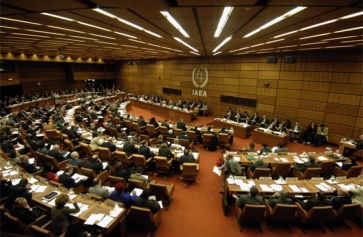IAEA Resolution on the “Application of IAEA Safeguards in the Middle East” is adopted by consensus

The newly introduced resolution, which was put forth by Egypt, Kuwait, Lebanon, Morocco, Qatar, Saudi Arabia, Sudan and the United Arab Emirates was passed without a vote. The resolution affirmed the “urgent need for all states in the Middle East” to adopt full-scope IAEA safeguards as a confidence-building measure and a step towards realizing a nuclear-weapon-free zone in the Middle East. The IAEA Director-General was requested to take necessary measures to facilitate the early application of Comprehensive Safeguards to all nuclear activities in the region, including the preparation of a model agreement taking into account the views of regional states, as a necessary step towards the creation of a nuclear-weapon-free zone. Israel joined the consensus on the resolution noting that IAEA safeguards should be applied in the Middle East in the context of a nuclear-weapon-free zone based on the following principles: primacy of zonal initiatives, negotiations among the states in the region, and verification of agreements through mutual inspections complemented by IAEA safeguards.
This resolution was subsequently adopted annually without a vote until 2006.
Photo credit: IAEA/Dean Calma
A general view of the IAEA Board of Governors meeting. February 2, 2006


